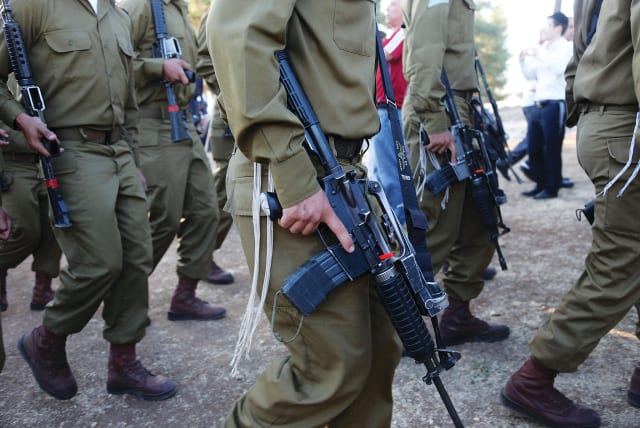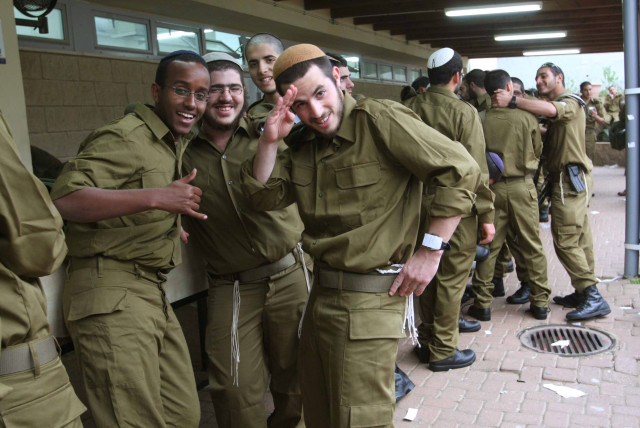Haredi soldiers and the struggle for community acceptance

As the story of the haredi community and the broader Israeli society unfolds, the challenge lies not just within the haredi community but in the willingness of the entire society to adapt and grow.
In a world where every action has a price, breaking away from social norms is akin to stepping into uncharted waters. This is particularly true in societies where tradition holds a tight grip, like the case of the haredi community.
Imagine living in a world where centuries-old traditions dictate your every move. Now, picture what happens when someone dares to step outside these boundaries.
This isn’t just a theoretical question; it’s the reality for haredi soldiers who choose to serve in the Israel Defense Forces. Our institution, Tatya, together with Dr. Yael Yitzhaki Brown from Tel Aviv University’s School of Social Work, unveils the stark truth: these individuals face a daunting social chasm upon their return, often shunned by the community they grew up in.
A desire to serve their country
But here’s where it gets intriguing. Despite the ostracism, these soldiers deeply desire to reconnect with their roots. Their story isn’t just about defiance but a longing for belonging, a testament to the unbreakable bond with their heritage.
The plot thickens with recent developments. In a twist of fate, during the current military conflict, the sight of haredim in uniform, performing various roles from medical to defense, nudged public opinion. This slight shift in perception hinted at a softening of stigmas, a crack in the once impenetrable wall of tradition.
Recent research revisited the topic of stigma within the haredi community, mainly focusing on attitudes toward its soldiers. This study, which followed up with participants from a previous investigation, revealed a notable change in perceptions. Compared to the previous year, there was a 14% decrease in negative views of young ultra-Orthodox men who serve in the military. These individuals are now seen less negatively as soldiers and in their family environments, which are perceived as less dysfunctional.
Furthermore, the community’s adherence to strict and unyielding norms has softened, evidenced by a 10% decrease in the perception of these norms as inflexible. This shift indicates a growing openness within the community, with less rigid expectations about individual behavior.
It’s important to note that the community’s strong desire to maintain its identity and cohesion remains unchanged. However, a discernible change exists in how the community views its members who choose military service.
For example, perceptions of haredi individuals who serve in the military as being “failures,” spiritually inferior, or disqualified from performing educational roles in the communities have all declined significantly. Perhaps the most telling indicator is the significant decline in the belief that such individuals will not be able to find a good marriage match, the overarching indicator and driver of social standing in the haredi community.
This trend extends beyond the context of just military service. Starting in 2020-21, the data show a consistent increase in the size of the haredi population willing to contribute to civil society beyond the boundaries of its narrow communities.
For example, there is an increase of more than 25% in the proportion of haredi people who express a strong willingness to perform civil service. Significantly, this sentiment is not driven by perceived material or occupational gains that might result from such service.
This evolving scenario poses a riveting question: Can a society, deeply rooted in its ways, find room for flexibility? Is there a middle ground where one can honor one’s heritage and embrace new roles without facing societal backlash?
The dynamic between the haredim and secular Jews adds layers to this narrative. During the recent COVID pandemic, fleeting moments of unity emerged, such as soldiers distributing food in Bnei Brak. We are witnessing thousands of haredi volunteers actively participating in home front activities. These instances are like the opening pages of a new chapter. But lasting change demands more than fleeting moments of solidarity; it calls for a sustained reexamination of societal norms.
As the story of the haredi community and the broader Israeli society unfolds, today’s decisions will script tomorrow’s chapters. The challenge lies not just within the haredi community but in the willingness of the entire society to adapt and grow. The burning question remains: Are we ready to rewrite our societal norms for a future where tradition and change coexist harmoniously?
The writer is on the faculty at Tel Aviv University’s public policy dept., and vice president of the Tatya Institute.
Jerusalem Post Store
`; document.getElementById("linkPremium").innerHTML = cont; var divWithLink = document.getElementById("premium-link"); if (divWithLink !== null && divWithLink !== 'undefined') { divWithLink.style.border = "solid 1px #cb0f3e"; divWithLink.style.textAlign = "center"; divWithLink.style.marginBottom = "15px"; divWithLink.style.marginTop = "15px"; divWithLink.style.width = "100%"; divWithLink.style.backgroundColor = "#122952"; divWithLink.style.color = "#ffffff"; divWithLink.style.lineHeight = "1.5"; } } (function (v, i) { });

